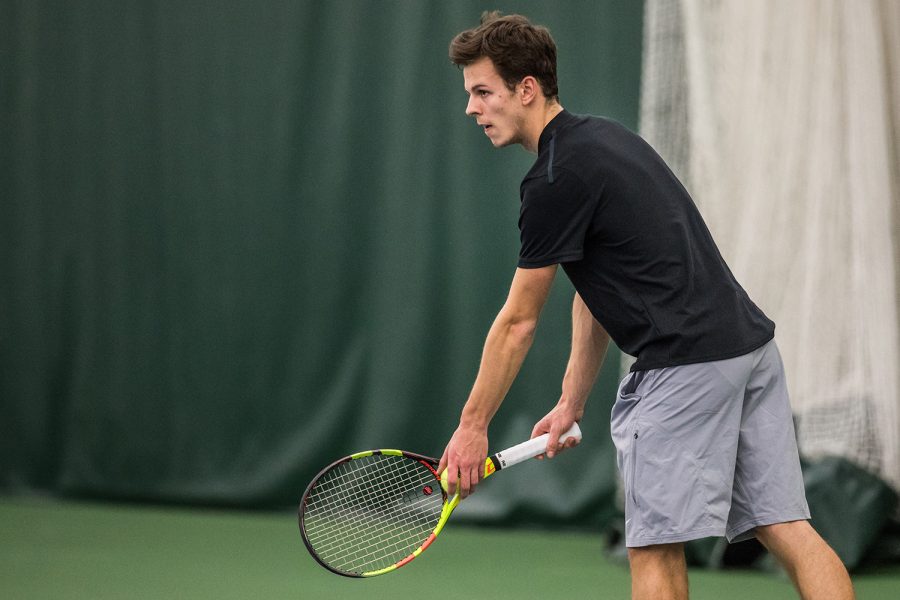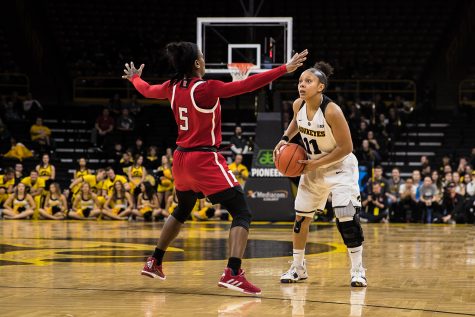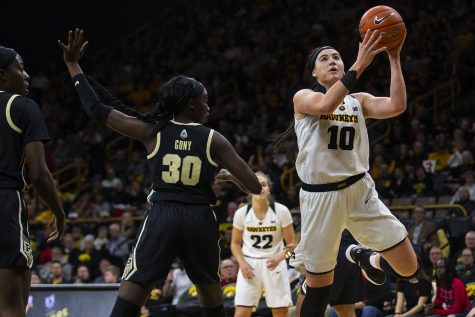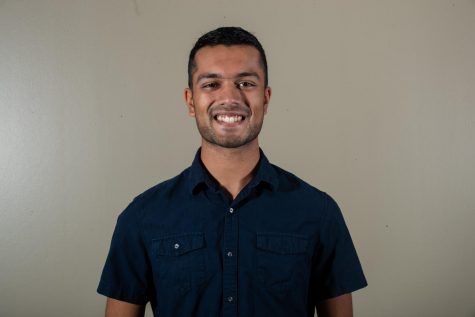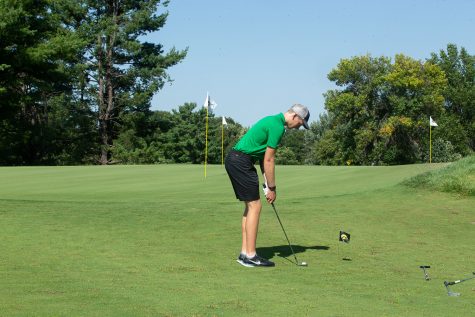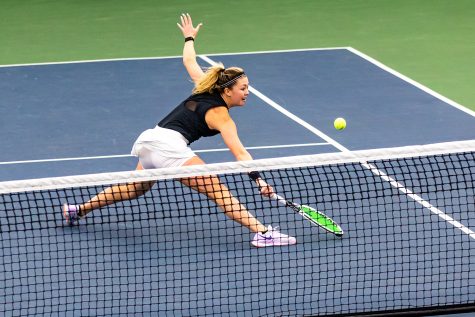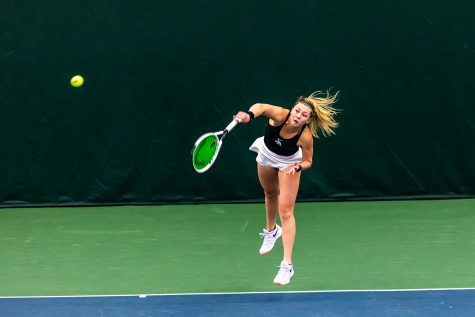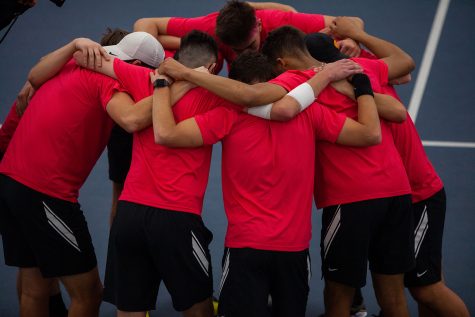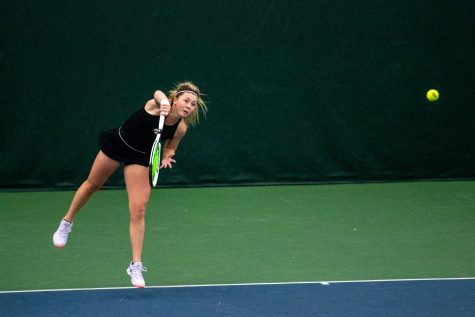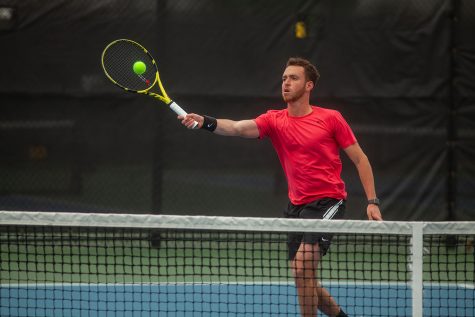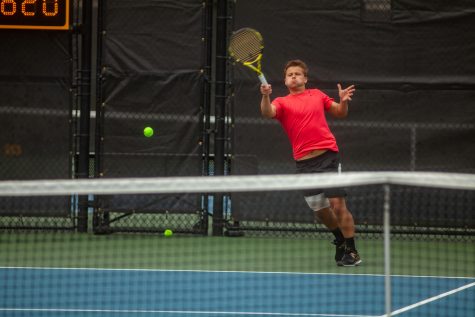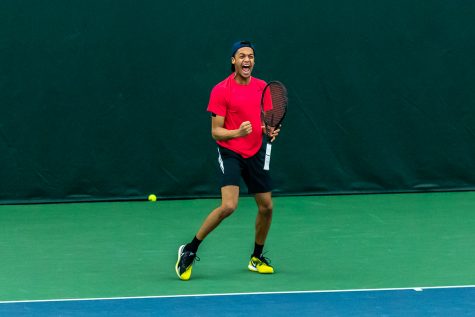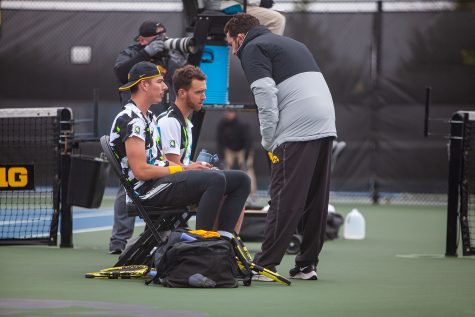Poland native Smietana comes to Iowa for better opportunity
Piotr Smietana needed opportunities to extend his tennis career, and he found them at Iowa.
Iowa’s Piotr Smietana prepares to serve during a men’s tennis match between Iowa and East Tennessee State on Friday, January 25, 2019. The Hawkeyes defeated the Buccaneers, 4-3.
February 4, 2019
Sophomore Piotr Smietana came to Iowa with one goal in mind: to improve his tennis skills.
The underclassman came from Krakow, Poland, to continue his tennis career when it looked like his time was up.
For perspective, in Poland, there aren’t many opportunities to continue a tennis career once the player reaches 18 years of age. There’s no team tennis, no coaches to prepare them for a professional career. So unless there’s lots of capital to spend for training or sponsorship, it’s really unlikely to continue a professional tennis career. And Smietana didn’t have either.
The Polish star started playing tennis at the age of 5 with influence from his father. By the age of 10, he was competing in top-notch tennis tournaments all over Europe. He traveled with his father to such places like Czechia, Russia, and Germany to see how he stacked up against the competition.
Eventually, he went on to become a three-time Polish National Champion, winning the title for U14 in 2010, U16 in 2014, and U18 in 2016 in the Junior Circuit of the International Tennis Federation. To date, the peak of his career was when he ranked No. 52 in the world in the federation’s U16 tournament in 2014.
Nevertheless, with all that success, Smietana began to struggle and lost plenty of matches when he was 18. The reason? In Poland and other European countries, they do not focus on the little details like the United States.
Foreign countries put more of an emphasis on playing as many tennis matches as possible as compared with the U.S., where a player needs to be prepared physically with weightlifting and physical and mental conditioning.
RELATED: Iowa tennis stays perfect across the country
“I would say we spend half of the time in the gym and half of the time on the tennis court [at Iowa],” Smietana said. “In Europe, you spend 100 percent of the time on the tennis court. Here in America, you know it’s more nutrition and mental preparation. It’s a completely different approach.”
That’s the type of preparation Poland and other European countries lack compared with the U.S. In fact, Smietana never lifted weights until he got to Iowa.
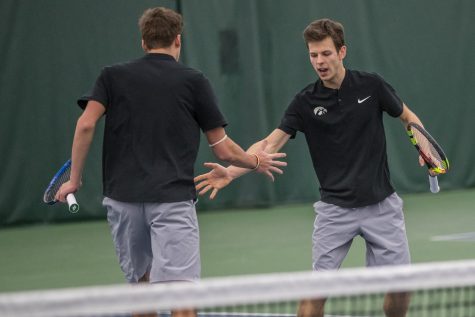
Iowa’s Piotr Smietana high-fives Joe Tyler during a men’s tennis match between Iowa and East Tennessee State on Friday, January 25, 2019. The Hawkeyes defeated the Buccaneers, 4-3.
“That’s one of the main reasons I came to the United States,” he said. “The college tennis makes the competition really high. The universities have money for big facilities. In Europe, if you want to play tennis, you need to find a sponsor or be wealthy and have to do it on your own. Here, you have a team, staff, coaches who help you get better.”
Another reason for his transition to the college level is the lack of tournaments. In Poland, Smietana would only have three federation tournaments a year to get ranked. That’s not many opportunities. But even with limited opportunities, tennis is very popular in Poland.
“Right now, tennis has a big influence in Poland,” Smientana said.
Given the recent boom in tennis popularity in Poland, Hawkeye head coach Ross Wilson gave Smietana a call and a flight ticket to visit Iowa.
“I know Ross is a great team coach and has a lot of experience in doubles, so I knew by just coming, I would gain a lot of valuable experience,” Smietana said. “Also, when I was 18, I was losing a lot because of the lack of weights, so I knew the United States would be a perfect solution since they put a lot of emphasis on the weights so I can get stronger, better. On the other hand, I can get an award-class degree.”
Like many international players, Smietana came for the opportunities that foreign countries simply can’t provide.
Although Smietana doesn’t know what his future holds in terms of tennis, he would like to go back to Poland once he graduates to see how he does professionally for a year.



